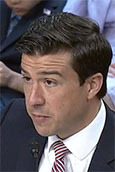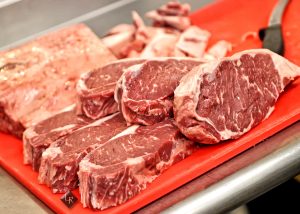Senate confirms Lindberg amid ag trade conflicts

Lindberg-RFP-081125
The Senate on Saturday confirmed President Trump’s nomination of Luke Lindberg to be agriculture undersecretary for trade and foreign agricultural affairs.
The vote on Lindberg was 78 to 17. The agriculture undersecretary for trade and foreign agricultural affairs promotes U.S. ag exports while the Office of the U.S. Trade Representative handles trade negotiations.
Lindberg served as chief of staff and chief strategy officer at the Export-Import Bank of the United States during Trump’s first term.
Most recently, he led South Dakota Trade, a public–private partnership focused on expanding international market access for regional exporters. Lindberg holds degrees in government and politics, public policy and business administration from the University of Maryland.
Lindberg is the son-in-law of Senate Majority Leader John Thune, R-S.D.

Senate Agriculture Committee Chairman John Boozman, R-Ark., in a news release congratulated Lindberg and described him as “a tireless advocate for restoring American agriculture’s global competitiveness and delivering results for producers across the country.”
Agriculture Secretary Brooke Rollins said in a news release she was “thrilled” to have Lindberg on her team, but also took the opportunity in a news release to differentiate the Trump administration’s approach to trade from the Biden administration’s approach.
“President Trump is reorienting our global trade relationships to put America first,” Rollins said.
“Over the last four years, our trade agenda favored foreign competitors over America’s farmers, ranchers and producers. This led to a $50 billion agricultural trade deficit, when under President Trump we had a surplus.”
Tom Vilsack, the agriculture secretary in the Biden adminsitration, told The Hagstrom Report in an email that there were trade deficits during the first Trump administration and that during the Biden years U.S. ag exports hit record highs. Vilsack also noted that the ag trade deficit has hit a record high during the last six months.
DTN/Progressive Farmer noted in an analysis Friday that, while Trump continues to impose tariffs on U.S. trading partners, “U.S. agricultural export sales right now remain down from a year ago while commodity groups continue to look for the light at the end of the tunnel.”
The New York Times also noted Friday that Trump’s tariffs will also increase the cost of farm inputs and imported food and could lead countries to retaliate by declining to import ag and food products from the United States.
On Friday, the National Corn Growers Association and 25 state corn grower groups sent Trump administration officials a letter expressing concerns about the impact of tariffs on farm input costs.
“As grassroots organizations representing 300,000 corn growers in the United States, we write to you sharing concern with the price and availability of inputs, specifically fertilizers,” the letter said.
“We raise the importance of this issue as it is quickly becoming a dire financial situation on family farms across the United States. U.S. corn growers are facing elevated prices on fertilizers and other inputs that are unfortunately approaching disastrous levels.
“Farmers source inputs from a variety of different supply chains, both domestic and imported. However, when imports are subjected to antidumping and/or countervailing duties, the resulting duty contributes to higher prices that [are] ultimately paid by farmers…
“We stand ready to supply your agencies with any information needed to alleviate the burden of input costs on farmers and sincerely appreciate your attention to our concerns,” the letter said.
Axios also reported that consumer prices for coffee and some other breakfast items are going up due to Trump’s tariffs on imports, but not on orange juice because the president has exempted that from his Brazilian tariffs.



